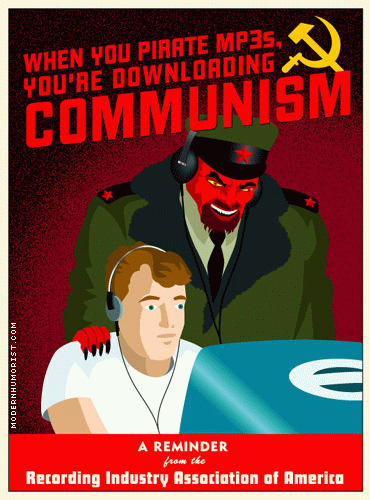File Sharing: A Moral Wrong
''Today’s
pirates operate not on the high seas but on the Internet, in illegal CD factories,
distribution centers, and on the street. The pirate’s credo is still
the same--why pay for it when it’s so easy to steal? The credo is as
wrong as it ever was. Stealing is still illegal, unethical, and all too frequent
in today’s digital age'' - The RIAA
Where They Stand
The RIAA defines online piracy as ''the unauthorized uploading of a copyrighted sound recording and making it available to the public, or downloading a sound recording from an Internet site, even if the recording isn't resold''. Not only do proponents of this perspective view file sharing as theft, and therefore, morally reprehensible, they also argue that online file sharing hurts industry profits and results in a poorly manufactured product that does not include the ''superior sound quality, art work, and insert information included in legitimate product.''

The RIAA argues that the industry loses about $4.2 billion to piracy worldwide - a figure which boils down to losing millions of dollars a day to all forms of piracy.
Opponents of file sharing argue that ''Each sale by a pirate represents a lost legitimate sale, thereby depriving not only the record company of profits, but also the artist, producer, songwriter, publisher, retailer, ... and the list goes on." In short, file sharing is seen as nothing more than theft and, therefore, should be considered a moral wrong. The crusade of recent lawsuits against online music downloaders is a clear indication that opponents of file sharing do strongly believe that morality has a very important place in the realm of virtual reality.
What is Being Done
Currently the RIAA and the United States government have taken several steps in an attempt to curb the spread of file sharing. A draft bill circulated among members of the House Judiciary Committee on March 25, 2004 would make it much easier for the Justice Department to pursue criminal prosecutions against file sharers by ''lowering the burden of proof.'' The bill, obtained would seek penalties of fines and prison time of up to 10 years for file sharing.
In addition, on March 25, 2004 Senators Orrin Hatch (R-Utah) and Patrick Leahy (D-Vermont) introduced a bill that would allow the Justice Department to pursue civil cases against file sharers, again making it easier for law enforcement to punish people trading copyright music over peer-to-peer networks. They dubbed the bill 'Protecting Intellectual Rights Against Theft and Expropriation Act of 2004' or, ''The Pirate Act''.

''Unfortunately,
piracy and pornography could become the cornerstones of a 'business model'...
The illicit activities of file sharers then generate huge advertising revenues
for the architects of piracy' - Senator Orrin Hatch
If the draft becomes law, anyone sharing 2,500 or more pieces of content, such as songs or movies, could be fined or thrown in jail. In addition, anyone who distributes content that hasn't been released in wide distribution (for example, pre-release copies of an upcoming movie) also would face the penalties. Even a single file, determined by a judge to be worth more than $10,000, would land the file sharer in prison.
The push for legislation on file sharing is not the only action being pursued. Indeed, in January of 2004, the RIAA filed 261 lawsuits against individual Internet music file sharers and also announced an amnesty program for people ''who admit they illegally trade songs on the internet.''
Future Implications
The current debate regarding the morality/legality of file sharing is certain to continue long into the future. The ability of the RIAA to push legislation through Congress criminalizing file sharing would have a tremendous impact on soceity's understanding of intellectual property and the way in which the internet can be used as a vehicle of exchange. The RIAA states that its goal is ''to make the Internet a legitimate marketplace for sound recordings, and that can’t happen unless artist and record company rights are respected.''
Others, however, remain skeptical that the present course of actions will yield this result. In response to the proposed amnesty program, Wendy Seltzer, attorney for the Electronic Frontier Foundation, said ''rather than demanding that 60 million people sharing music files turn themselves in with a so-called 'amnesty' program, the recording industry should take this opportunity to make file-sharing legal in exchange for a reasonable fee.''
In addition, Adam Eisgrau, P2P United Executive Director, noted that ''As the 40 percent increase in downloads over the last year makes alarmingly clear, like it or not file sharing is likely to (continue) on a massive scale no matter how many suits are brought and what the fine print of copyright or criminal law says.''
He also noted that ''putting a tiny percentage of tens of millions of American file sharers behind bars or in the poorhouse won't put one new dime in the deserving pockets of artists and other copyright owners.''
Check out the Opposing View HERE